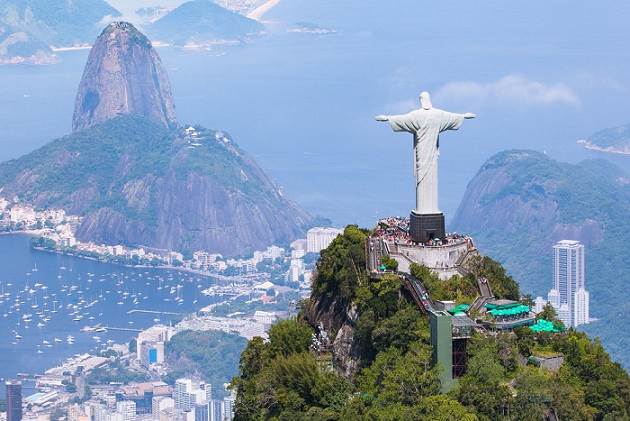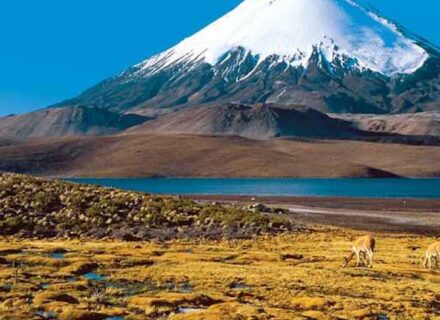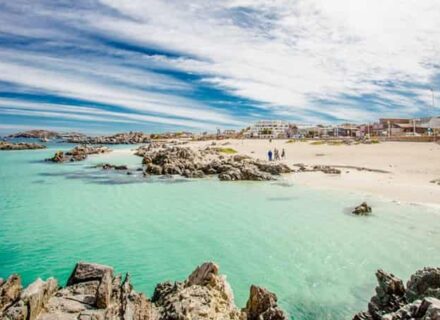Knowing the best time to visit Brazil depends on the focus of your holiday. Is your intention to party for days on end? Or is to unwind on secluded beaches, or hike through steamy jungles? The weather can vary dramatically between regions. When it’s cool and breezy along the coast, inland can still be hot and humid.
High season runs from December to January, when tourists flock to Brazil to enjoy the warm weather over the Christmas holidays. This unfortunately, increases prices across the board. The other busy time of the year in Brazil is during Carnaval, in February/March. On the whole, the best time of year to visit is during September and October. August can also be a good time, weather-wise.
Did you know?
Brazil’s tallest mountain, Pico da Neblina, wasn’t discovered until the 1950’s as it’s shielded almost entirely by dense clouds.
The weather in Brazil
The weather in Brazil is temperate all year round, but generally, the humidity and heat will increase the further north you go. Temperatures increase from November – March, with Rio becoming unbearably hot, at around 40-50°C. Brazil’s rainy season begins in December, but the heaviest rainfall happens between March and May.
The Amazon Rainforest is hot, sticky and humid all through the year. If you visit during the rainy season, however, from October – March, you will most likely be travelling by small boats, rather than on foot do to the intense rainfall. Remember, Winter and summer in Brazil are opposite to the Northern Hemisphere.
Best time to see wildlife in Brazil
The summer months in Brazil are also the wettest, making wildlife watching tricky. In the height of summer, Pantanal is completely inaccessible, with the worst time being between February and March. It’s best to visit Pantanal during dry season from May – September. The best time for visiting the Amazon is from May – June, just between the rainy and sunny seasons. You can still visit during the rainy season, but only by boat. To catch the whale migration, head to Santa Catarina in July – November.
Four Seasons in Brazil
Spring
September – December
Spring is the beginning of wet season, bringing tropical rains and thunderstorms. As the weather begins to warm up, flora reappears, with orchids and lilies starting to bloom, filling the air with a spring aroma. It’s usually a little cheaper and less crowded during spring. This is also a great time to visit the Iguazu Falls.
Summer
December – March
The summer in Brazil is tropical – the further north you go, the hotter the weather will be. Summer is the best time of year to swim in the sea. The majority of major events in Brazil happen during summer – Christmas, New Year’s, Carnival, Revillon. The celebrations are endless.
Autumn
March – June
The crowds and costs tend to be much lower than during summer, as the hot and humid weather begins to ease off. The smaller crowds make autumn the ideal time for exploring cities. It’s a great time to visit the Amazon towards the end of the season, and the Pantanal after April when the rains have let up.
Winter
July – September
Winter is Brazil’s dryest time of the year however, it does still rain in Rio. The further south you are in winter, the cooler it will be. The north tends to remain pretty tropical floating around 25-32°C. Rio’s temperatures land between 14-25°C. Many resorts close for winter so you will need to book well in advance.
Festivals & Events in Brazil
Brazilians love their holidays, and if you ever get a chance to experience one of their events, you’ll understand why. Home to some of the most famous parties in the world which often continue for weeks, festivals in Brazil offer a unique experience that should be treasured. But, if you prefer your holidays more on the quiet side, it’s good to know the key dates to avoid when planning your trip!
Octoberfest
Blumenau
(9th – 27th October)
Traditionally a German festival that has gained worldwide fame, the Brazil Oktoberfest is one of the biggest in the world. The event is held in Blumenau, a stunning German-colonised city equipped with beautiful Bavarian houses. Two weeks of constant beer and music, where German and Brazilian cultures collide.
Independencee Day
All over Brazil
(7th September)
Celebrations on Independence Day (commonly referred to as Sete de Setembro) include parades and street parties that go on well into the early hours of the morning. It’s a national holiday so expect the majority of shops and businesses to close.
Carnival
Rio de Janeiro
(late February/early March)
Rio Carnival is well-known to be the most epic party on earth. Literally meaning the ‘celebration of life,’ Rio Carnival is just that. This grand affair comes with colourful, giant floats, costumed dancers, energetic drummers, performers, samba dancing and lots of cachaca. Salvador and Paraty also hold incredible carnivals if you prefer not to deal with the large crowds at Rio.
Folklore Festival
Parintins
(June)
The largest event in Brazil, only being beaten by Carnival, celebrates the legend of the resurrected Ox. The festival lasts for three days and includes performances, reenactments of the Amazonas legend, dancing, singing and parades with multicoloured floats. The festival closes with a fireworks display.
Festa do Peao
Barretos
(15th – 25th August)
Brazil’s own cowboy festival is a great event to attend if you want to experience a South American Rodeo. 35,000 people gather, dressed in cowboy boots and ranch hats to celebrate all things cowboy. There’s everything here from horse-riding to bull-riding, with spectacular shows held in the arena to the sound of traditional country music.
Festival de cachaca
Paraty
(17th – 30th August)
It’s always good when there’s an entire event dedicated to one drink – this one’s the Cachaca, Brazil’s national liquor. This three-day festival celebrates the delicious liquor made from cane sugar. Taste as many as you can stomach of the countries best beverage while dancing to samba and indulging in the delicious local food trucks.
New Year’s Eve
Rio de Janeiro
(31st December)
Rio is well-known as being one of the best places to bring in the New Year, Copacabana being the primary spot for live music. It’s tradition to wear white, forgive any tarnished relationships, and start anew in the new year. Everyone gathers at the beach to watch fireworks over the sea and throw white flowers into the waves.
Iemanja
Salvador
(2nd February)
Yemanja is a unique event held in Salvador to honour the Goddess of the Sea. Locals make gifts of perfume, flowers and jewellery and offer them as gifts to the waves. Praia Vermelha hosts a massive party on the beach accompanied by live music and a delicious selection of local street food.
Other public holidays to be aware of when planning your trip to Brazil
- 1 January – New Year’s Day
- 4 & 5 March – Carnival
- 6 March – Ash Wednesday
- 19 April – Good Friday
- 21 April – Tiradentes Day
- 1 May – Labour Day
- 12 May – Mother’s Day
- 20 June – Corpus Christi
- 9 July – State Rebellion Day
- 7 September – Independence Day
- 12 October – Lady of Aparecida
- 28 October – Civil Servants Day
- 2 November – All Soul’s Day
- 15 November – Republic Day
- 20 November – Zumbi dos Palmarea
- 25 December – Christmas Day



